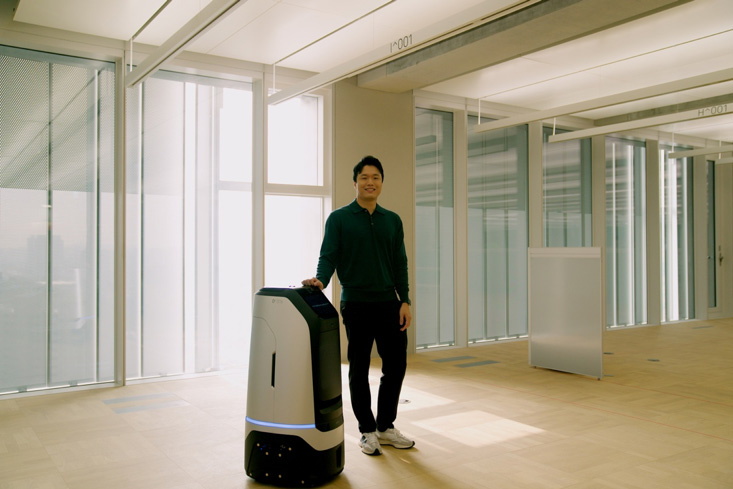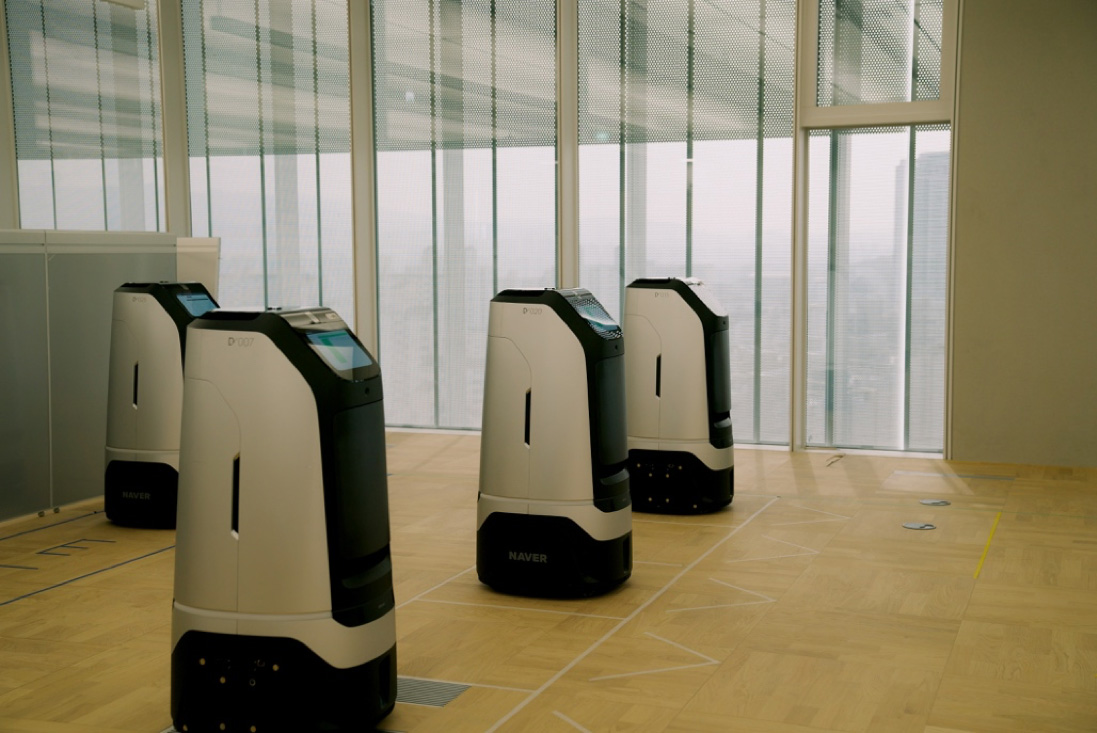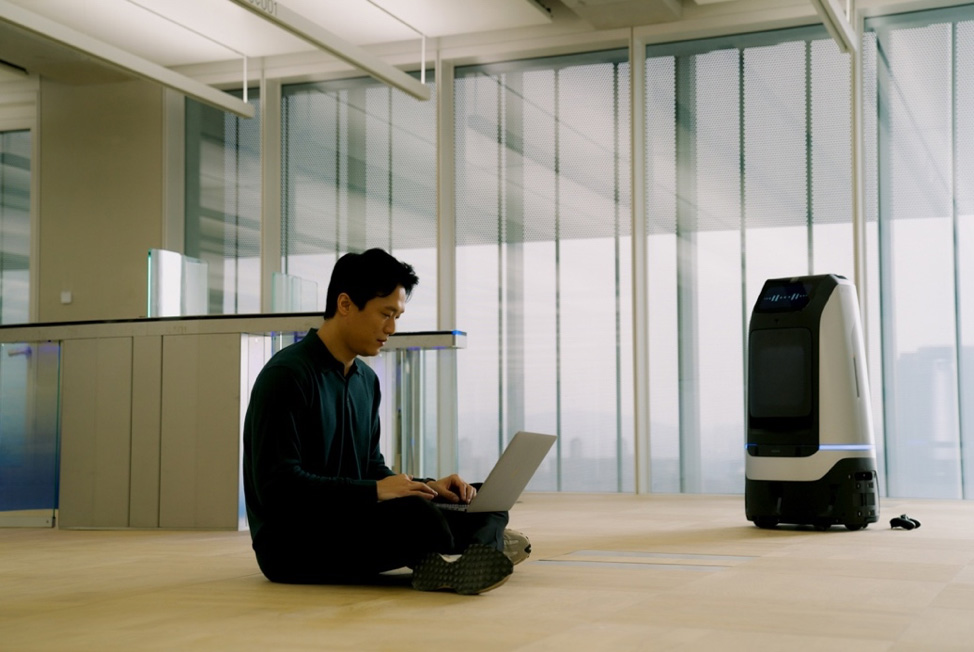
로봇을 만들기 위해 사람을 공부합니다
- 박경식
- Tech
- Hardware 직무 바로가기
10여 년 전 우연히 대학원에서 로봇의 세계에 발을 들인 후 줄곧 로봇을 만들고 있다는 네이버랩스 개발자 박경식. 로봇 청소기를 개발하는 대기업 전문요원으로 첫 커리어를 쌓은 후, 다섯 명 규모의 작은 벤처회사에 합류해 짐을 옮기는 공항 서비스 로봇을 만들었다. 대기업과 벤처기업을 고루 경험한 그가 다음 커리어로 네이버랩스를 선택한 이유는, 제조 기반이 아닌 ‘IT회사에서 정의해 나갈 로봇’에 호기심이 생겼기 때문. 4년 전 네이버랩스에 합류해 지금은 ‘AROUND’라는 모바일 로봇의 프로젝트를 이끌고 있다. 그는 ‘AROUND’를 자신에게 운명처럼 온 프로젝트라고 소개했다.

네, 10년째 바퀴 달린 모바일 로봇만 만들고 있습니다. 로봇 개발이 처음부터 꿈이었다기보다 우연히 이 일을 시작하게 된 편에 가깝긴 합니다. 그런데 처음에 큰 기대를 가지고 한 게 아니다 보니까 오히려 더 애정 있게 오래 할 수 있는 것 같아요.
일단 랩스는 규모는 크지 않지만 로봇의 A부터 Z까지를 다 할 수 있는 기업 중에서는 가장 잘하지 않나 싶어요. 하드웨어부터 소프트웨어는 물론이고 클라우드 인프라까지 다 가지고 있어 토탈 솔루션이 가능한 회사고요. 하드웨어 제조 베이스 회사는 생산 규모가 크니까 속도가 느린데, 저희는 조금씩 빨리 만들어 보고, 잘 되는지 보고 다시 변경하고, 이런 식으로 애자일하게 개발할 수 있어요. 특히 이런 하드웨어부터 소프트웨어까지 우리의 입맛에 맞게 만들 수 있다는 점은 다른 회사에서는 쉽게 찾아볼 수 없는 특징으로 생각하고 있습니다.
지금 저희 팀에서는 모바일 로봇 AROUND의 소프트웨어나 자율주행을 개발하고 있고, ‘AMBIDEX’라는 다리는 없고 양팔 달린 로봇의 소프트웨어 플랫폼 개발도 하고 있어요. 그 외에 클라우드와 연동한 로봇 소프트웨어 개발하는 일도 하고 있습니다.

AROUND는 네이버 신사옥에서 직원들을 서포트하는 기능을 수행하는데요. 임직원 분들이 택배 같은 게 오면 직접 받으러 가셔야 되는데 그걸 자리까지 로봇이 원하는 시간대에 맞춰서 갖다 드리는 기능을 첫 번째 서비스로 준비하고 있습니다. 그다음에는 점심시간에 음식을 자리로 배달시켜 드릴 수도 있고 굳이 카페에 안 가시더라도 자리에서 커피를 마셔 보실 수 있게 하는 서비스를 준비하고 있습니다.
같은 공간 내에 로봇이 많으니 해결해야 할 이슈들이 많이 발생해요. 공간적으로 어쩔 수 없이 좁은 곳을 여러 대의 로봇이 지나가야 되고요. 네이버 신사옥은 로봇 전용 엘리베이터도 만들긴 했지만 그걸로는 100대의 로봇을 한꺼번에 움직이기에는 당연히 모자라기 때문에 서비스와 로봇의 이동 효율을 어떻게 밸런싱을 할지, 사람한테 피해는 안 주면서 서비스 퀄리티를 높일 수 있을지, 이런 부분에서 균형을 잡는 법에 많은 신경을 쓰고 있습니다. 기술적인 해결보다도 정책적이나 운영상 풀어야 하는 사안이기도 해서 복잡도가 있죠. 사람이 사는 사회에 대한 이해를 바탕으로 로봇이 잘 스며들 수 있도록 하는 기획 측면, 시나리오 측면의 고민들이 많이 필요한 상황입니다.
‘AROUND’를 하게 됐을 때인 것 같아요. 전임자가 갑자기 나가게 되면서 저한테 맡겨 주신, 약간 운명처럼 온 프로젝트인데요. 제가 자신 있어 하는 ‘모바일 로봇’ 분야이기도 해서 되게 재미있게 했었던 것 같아요. 그냥 밤낮없이 계속 이거 생각만 했었으니까요. 이전 회사에서 맡았던 로봇 청소기나 공항 로봇 같은 경우는 이미 어느 정도 기획이 됐던 제품이었는데, AROUND는 제가 초기 기획부터 참여하여 처음부터 끝까지를 다 참여한 프로젝트라서 더 애정을 가지고 있습니다.
곤충 행동양식들을 좀 관찰을 많이 하는 편이에요. 생물학 논문들 중에서 내비게이션이나, 주행 매커니즘에 관한 논문들도 많아서 그런 걸 많이 읽고, 곤충이 집으로 돌아가는 행동이라든지 먹이를 찾는 행동에서 아이디어를 얻어서 로봇에 적용하려고 하고 있어요. 지금 AROUND 로봇 같은 경우는 시야각이 굉장히 넓은 카메라를 가지고 위치를 잡고 있는데 실제로 개미나 벌의 눈이 되게 시야가 넓거든요. 이런 데서 아이디어를 착안해서 적용을 한 사례고요. 그 외에도 곤충들이 가진 장점들이 굉장히 많은데 앞으로 차차 저희 로봇에 녹여 갈 계획입니다.
로봇의 지능을 개선할 수 있는 AI를 더 연구하고 싶긴 해요. 사실 지금의 로봇이 사람이 만족할 수 있는 서비스를 할 수 있는 잠재력이 있느냐, 이런 측면에서는 근본적으로 의문이 있어요. 지금의 로봇은 융통성이 거의 없어요. 저는 융통성이라는 게 굉장히 고차원의 지능이라고 생각을 하는데요. 예를 들어 배달하는 로봇이 목적지에 도착해서 사람이 없는 경우 5분을 기다리게 되어 있는 시나리오가 있을 때, 상황에 따라 5분에서 1초만 더 기다리면 될 수도 있고, 5분을 기다리는 것 자체가 아예 의미 없어서 바로 돌아와야 하는 상황도 있을 수 있거든요. 5분이라는 원칙이 아니라, 스스로 그때그때 상황에 맞게 융통성 있게 판단을 할 수 있어야 사람에게 만족스러운 서비스가 가능할 거라고 봐요. 현재 로봇에 적용되는 기술은 이런 대응이 매우 힘들죠.
“로봇을 개발한다는 건 오히려 인간에 대한 이해가 많이 필요한 영역이에요.”
요새 머신러닝이나 이런 얘기들에서는 이제 곧 스카이넷이 나와서 인류를 지배할 거라고 하지만 제가 볼 때는 사실하고는 거리가 먼 거 같고요. 머신러닝과 다른 새로운 패러다임의 지능에 대한 연구가 선행이 돼서 적용시킬 수 있어야 될 거 같아요.
로봇을 개발한다는 건 오히려 인간에 대한 이해가 많이 필요한 영역이에요. 조금 전 말씀드린 융통성도 사실 인간에 대한 이해가 있어야 발휘될 수 있는 거잖아요. 사람들이 이런 상황에서는 이런 거를 좋아하겠다라든지, 이런 문화를 가진 사회에서는 사람들이 어떻게
행동해야겠다, 이런 기반이 중요하기 때문에 결국 인간에 대한 이해를 잘 해야 서비스를 잘 하는 로봇을 개발할 수 있다고 생각을 하고 있습니다.
저는 원래도 학창 시절 공학, 수학을 잘하는 사람은 아니었어요. 아이러니하지만 오히려 인문학 쪽에 관심이 좀 많은 편이었고 그래서
지금 로봇을 하는 게 그런 쪽에서는 저랑 잘 맞는 부분이 있는 거 같아요.
일을 하는 동력이 자기 자신한테 있는 사람이 일을 잘하는 거 같아요. 다른 사람 때문에 일을 하지 않는 사람이라고 할까요. 동력이
자기 자신한테 있다는 건 이 일을 되게 사랑하고 있다는 증거이기도 하고, 잘하려고 스스로 노력을 하기 때문에 그 결과로 일을 잘하는 걸로 비춰지는 것 같고요.
그리고 회사에서는 벌린 일을 잘 마무리하는 것 자체도 굉장히 중요하다고 생각해요. 벌리기는 쉬운데 끝까지 마무리하는 게
프로페셔널로서의 조건인 것 같고요.
학계에서는 이미 연구가 끝난 주제들이 실제로는 전혀 유용하게 쓰이지 못하고 로봇이 아직까지 대중화되지 못했잖아요. 사업적으로도 아직 갈 길이 멀고, 저는 로봇을 좀 오래 해온 사람으로서 현재의 로봇이 굉장히 불만족스러운 게 큰 동력이에요. 앞으로 유용한 로봇을 만들어서 증명하고 싶은 마음이 큰 것 같아요.
당장은 놀고 싶겠지만 그것도 한두 달이면 질릴 거 같고요. ‘지능이 과연 어떻게 해야 융통성이 생길까’, 뭐 이런 쪽으로 탐구도 하고 연구를 좀 하지 않을까 싶습니다. 개인적으로 호기심 충족 차원, 그리고 일적으로도 미래에 이런 거를 만들고 싶으니까요.

Published APR. 2022
















